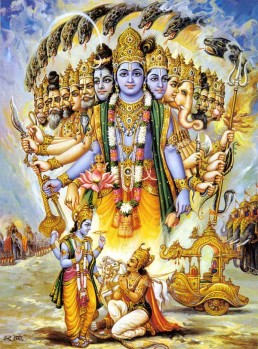Swami Chinmayananda
Swami Chinmayananda Commentary
The running commentary given out so long by Arjuna was the description of a stagnant Cosmic-Form, at once “marvellous and awful.” Here we find Arjuna describing the movements and actions that he observes in that Cosmic-Form of the Lord. “THESE HOSTS OF DEITIES” enter into and disappear in the Universal-Form. Shankara, commenting upon the expression “HOSTS OF DEITIES,” interprets it to mean the Duryodhana-fold. Though this interpretation is not inconsistent with what is yet to follow, it is true that this meaning is not the natural interpretation of the terms used in the text.
If some, who are thus irredeemably drawn towards the Lord’s Form, disappear therein, others who are waiting and watching the process are necessarily getting panicky with fear. When man is threatened with a sure mishap, and when he knows of no remedy or defence against it, he, in his despair, always turns to prayer. This psychological truth is beautifully brought out here, when it explains how “SOME IN FEAR EXTOL THEE WITH JOINED PALMS.”
And this is not all. Bands of great Rishis and perfected-men (Siddhas) who are not at all perturbed by the Vision of the Totality, because of their super-human tranquillity and inward peace arising from their own “wisdom,” merely sing sublime hymns of glory to the mighty appearance of the total phenomenal world of multiplicity. They do so wishing “MAY PEACE BE” to all, always. They realise in their “wisdom” that the face of the cosmos assumes such a terrible ferocity only when it has launched a wholesale reconstruction scheme. The mean of wisdom also know that nothing is lost in such a programme of “construction through destruction.” Therefore, they hail this process and wish the world a brilliant golden era, which is sure to follow immediately after such a total upheaval.
In this stanza, the entire world of phenomena has been beautifully brought under three heads: the “Sub-normal,” the “Normal,” and the “Super-normal.” The “Sub-normal” unconsciously die away. They are the victims of the process of death and they are so miserably unaware of the very process, that they do not at all revolt against it. The “Normal” dread when they intelligently observe and become aware of the process of decay and death. They become apprehensive of their own fate; and failing to realise that nothing is lost by death, they, in their ignorance, shudder at the inescapable lot of all living names and forms.
There is yet another set constituted of “Super-normal” men, who have sufficient apprehension of the Totality and Its behaviour, and who are not at all perturbed even if what is happening in the Universe everyday, were to visit them also one day. When bubbles are broken, there is no occasion to regret for those who know what they are and how they are born. Similarly, when these Siddhas see the upheaval that precedes a dying culture’s reorientation, they recognise therein the mighty Power of Truth and wish only good luck and peace to the world so reconstructed by the very hands of the Lord.
In whichever light we may observe this work, we must come to realise how great a psychologist Vyasa himself must have been and also how beautifully the knowledge of the mental behaviour has been harnessed for quickening the evolution of man to reach the fulfilment of all his struggles.
HOW THEN DID THE GODS OF THE HEAVENS REACT TO THIS SPECTACULAR VISION OF THE COSMIC-MAN IN ACTION?
Adi Sankara Commentary
Ami hi, those very; sura-sanghah, groups of gods, the soldiers engaged in battle-groups of gods such as the Vasus who have descended here in the form of human beings for eliminating the burden of the earth; visanti, enter-are seen to be entering; tvam, You. Bhitah, struck with fear, and unable to flee; kecit, some among them; grnanti, extol You; pranjalayah, with their palms joined. Maharsi-siddha [Siddha: A semi-divine being supposed to be of great purity and holiness, and said to be particularly characterized by eight supernatural faculties called siddhis.-V.S.A.]-sanghah, groups of great sages and perfected beings; seeing protents foreboding evil, etc. as the battle became imminent; stuvanti, praise; tvam, You; puskalabhih, with elaborate, full; stutibhih, hymns; uktva, saying; ‘svasti iti, May it be well!’ And further,
The Bhagavad Gita with the commentary of Sri Sankaracharya – Translated by Alladi Mahadeva Sastry
Holy Geeta – Commentary by Swami Chinmayananda
The Bhagavad Gita by Eknath Easwaran – Best selling translation of the Bhagavad Gita
The Bhagavad Gita – Translation and Commentary by Swami Sivananda
Bhagavad Gita – Translation and Commentary by Bhaktivedanta Swami Prabupadha
Srimad Bhagavad Gita Chapter 11 – Verse 21 – 11.21 ami hi tvam – All Bhagavad Gita (Geeta) Verses in Sanskrit, English, Transliteration, Word Meaning, Translation, Audio, Shankara Bhashya, Adi Sankaracharya Commentary and Links to Videos by Swami Chinmayananda and others – 11-21

